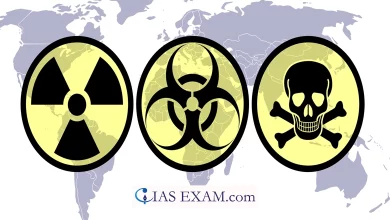Daily Current Affairs for UPSC
Blood bank study uncovers Long COVID incidence
Syllabus: Science & Technology [GS Paper - 3]

Context
An in-depth blood bank analysis has shed light on the real Long COVID scenario, bringing critical information into the ongoing discussion of the long-lasting effects of SARS-CoV-2 infection. This investigation represents the basis of revealing the long-term health challenges that are experienced by COVID-19 survivors.
Details about it
- The research used information on more than 238000 donors with a highly detailed strategy to detect if antibodies that react with anti-nucleocapsid (anti-N) had ever been present before in these individuals. This approach proved to be very competent as it serves to differentiate between people who had COVID-19 before and those who have been vaccinated because if a person had a shot they do not produce specific N antibodies.
- Incidence of Long COVID: The assessment revealed that a total of 43.3% of patients recovered from the acute phase of SARS-CoV-2 showed new symptoms lasting four weeks or longer after recovery. On one hand, this figure was 22.1%, among those who did not have the infection yet symptoms happened to be 87.9%.
- Symptoms and Severity: The variety of the Long COVID symptoms was seen to be quite distinct and several among them. Consequences related to brain function were reported by a quarter of all participants, whereas the changes affecting taste or smell were reported by a slightly smaller group of people – around one in four. Mentioning cardiac or respiratory symptoms was noted in around one in every seven people. The major ailments here are memory loss (12.7%) and fatigue (11.1%).
- Comparison with General Population: On the other hand, the non-infected control group, that had no recorded cases of coronavirus detected, showed symptomatic onset at a level expected from the general public. It further stressed the fact that among all the were persisting five years after coronavirus, 21.2% were clearly correlated to previous SARS-CoV-2 infection.
- Duration of Symptoms: Among those afflicted By Long COVID, 84.5% have been enduring the Long haul regarding symptoms, which supports the Chronic nature of the condition, while 15.5%, on the other hand, are still Symptom free.
- These findings highlight the imperative of continuous medical support for the individuals suffering with Long COVID that echoes through the healthcare landscape.
About Blood Bank Study and Correlation with COVID
- In the JAMA Internal Medicine research on 238,828 blood donors, 43.3% of the participants with prior SARS-CoV-2 infection reported lingering symptoms, compared to 22.1% of the participants without infection.
- With admission that 21.2% of patients may have post-infection symptoms because of this virus, blood tests were the end to most confirm the previous virus infection, which was a wonderful addition to this post COVID condition evaluation.
- COVID-19 additional aftermaths were more intense for women and those who previously had health issues.
- The most common symptoms N-degenerative (23.6%) and R-respiratory/cardiac (15.8%), together with cognitive impairments (12.7%) and fatigue (11.1%) are frequently I-distinguished.
- Symptoms of mental health problems were frequently similar among positive and negative datasets, pointing to indirect effects apart from direct interactions.
Conclusion
- This blood banks’ study on Long Covid that took nine months of comprehensive analysis shows the tendency for constant medical observance and post-recovery oversight.
- Especially with 43.3% of individuals that have already been exposed to the corona showing long-term symptoms, blood tests acted as very essential tools that contributed to the confirmation of the previous infection as well as the analysis of post-COVID conditions.
- Female and preexisting health conditions linked patient’s to the consequences cast as higher risk, that’s why it addressed access to general and specific types of interventions.
- The study’s findings throw light on various shades of that complex picture reflecting the impact in people’s life and the healthcare systems.
Source: The Hindu
UPSC Mains Practice Question
Q.Discuss the implications of the recent blood bank study on Long COVID incidence for public health policy and healthcare delivery. How can the findings of this study inform strategies for managing the long-term health challenges faced by COVID-19 survivors?





.png)



